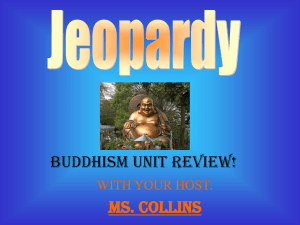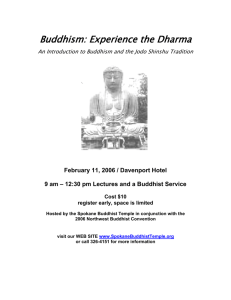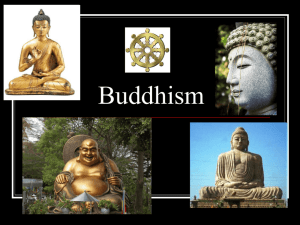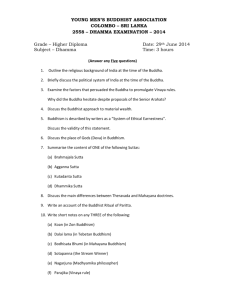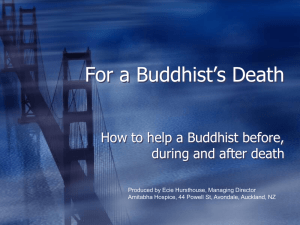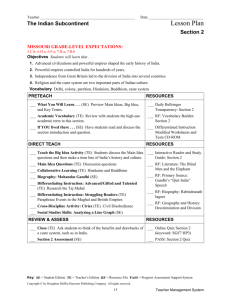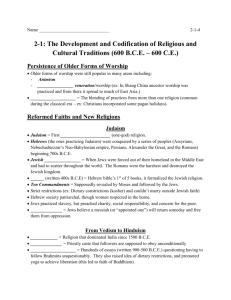Current World Affairs
advertisement
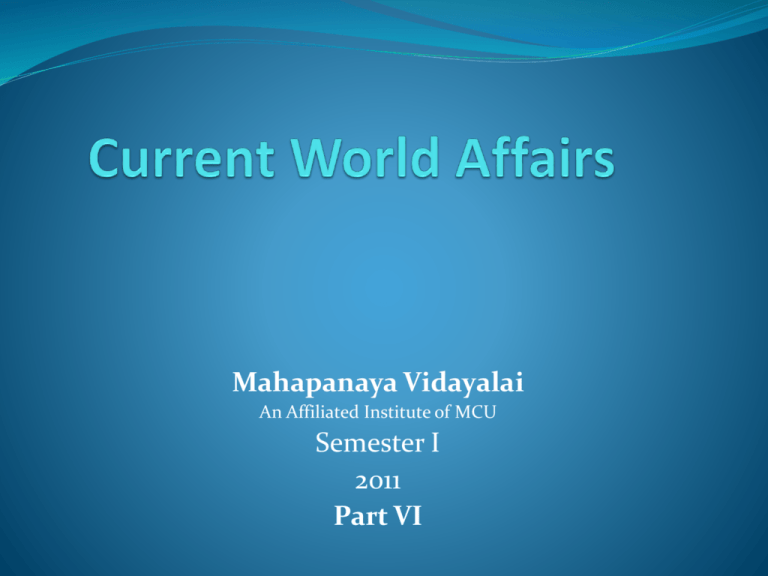
Mahapanaya Vidayalai An Affiliated Institute of MCU Semester I 2011 Part VI Buddhist Perspective on Social Discrimination A Caste System Hinduism perspective (No universally accepted theory about the origins of caste system, Caste: Brahmins, Kshatriya, Vaishya and Shudras, Fa Xian, a Buddhist monk China (400 AD) mentioned about Chandals, played an influential role in shaping economic activities) Christian perspective (Feudalismhierarchy of noble lords, Nobles vs Common, Monarch Nobles Commercial Capitalists ArtisansPeasant, PopeCardinalsArchbishopsBishopsPriests, Missionaries, and Monastic, Syrian or Latin in India ) Muslim perspective : (Ashrafs (Sayyads/Shiekhs/Mughuls/Pathan) vs Non Ashrafs, / Foreign land, converted from high Hindu caste, middle cast and untouchable caste/ 3 broad categories Ashraf/Ajlaf and Arzal) Class Hierarchy Social class: Group of people within a society who possess the same socioeconomic status. The term was first widely used in the early 19th century, following the industrial and political revolutions of the late 18th century. The most influential early theory of class was that of Karl Marx, who focused on how one class controls and directs the process of production while other classes are the direct producers and the providers of services to the dominant class. Max Weber emphasized the importance of political power and social status or prestige in maintaining class distinctions. Colourism Colorism is discrimination in which human beings are accorded differing social treatment based on skin color. The term colorism refers to when lighter skin tones are preferred and darker skin is considered less desirable or darker skin tones are preferred and lighter skin is considered less desirable. Colorism can be found across the world. Many historically favored and continue to favor lighter skin rather than darker skin. Racism Racism is the belief that characteristics and abilities can be attributed to people simply on the basis of their race and that some racial groups are superior to others. During the past 500-1000 years, racism on the part of Western powers toward non-Westerners has had a far more significant impact on history than any other form of racism (such as racism among Western groups or among Easterners, such as Asians, Africans, and others). The most notorious example of racism by the West has been slavery, particularly the enslavement of Africans in the New World. This enslavement was accomplished because of the racist belief that Black Africans were less fully human than white Europeans and their descendants. Gender Gender bias is the prejudice in action or treatment against a person on the basis of their sex. Eg. Payment of lesser salary to weaker sex workers. Sexism, also known as gender discrimination or sex discrimination, is the application of the belief or attitude that there are characteristics implicit to one's gender that indirectly affect one's abilities in unrelated areas Gender bias, the term is so deep rooted in our society that it’s quite impossible to drive out from the society. In every field it may be social, political, economic or cultural field we found a small or large discrimination among man & woman. Genocide is defined as "the deliberate and systematic destruction, in whole or in part, of an ethnic, racial, religious or national group. Genocide means any of the following acts committed with intent to destroy, in whole or in part, a national, ethnical, racial or religious group, as such:(a) Killing members of the group;(b) Causing serious bodily or mental harm to members of the group;(c) Deliberately inflicting on the group conditions of life calculated to bring about its physical destruction in whole or in part; (d) Imposing measures intended to prevent births within the group (e) Forcibly transferring children of the group to another group. History Taking both social definitions into account, governments have murdered probably around 174 million people during the 20th Century. Most of this killing, perhaps around 110 million people, is due to communist governments, especially the USSR under Lenin and Stalin and their successors (62 million murdered), and China under Mao Tse-tung (35 million). Some other totalitarian or authoritarian governments are also largely responsible for this toll, particularly Hitler's Germany (21 million murdered) and Chiang Kai-chek's Nationalist government of China (about 10 million). Other governments that have murdered lesser millions include Khmer Rouge Cambodia, Japan, North Korea, Mexico, Pakistan, Poland, Russia, Turkey, Vietnam, and Tito's Yugoslavia. Rwanda Genocide The Rwandan Genocide was the 1994mass murder of an estimated 800,000 people in the small East African nation of Rwanda. Over the course of approximately 100 days. It was the culmination of longstanding ethnic competition and tensions between the minority Tutsi, who had controlled power for centuries, and the majority Hutu peoples, who had come to power in the rebellion of 1959–62 and overthrown the Tutsi monarchy Nazi Genocide Holocaust, the systematic attempt of German authorities during World War II to kill all and every Jew no matter where found-to destroy Jews as a group. This murder of between 5 to 6 million Jews became the paradigm case of genocide and underlies the word's origin. Buddhism Perspective Five Major Fundamental Concepts of Buddhism 1. Mutability of Change All objects are regarded as being in continuous state of change. Nothing finite is eternally fixed or unchanging. 2. Cause and Effect This process of change, however is not considered to be chaotic but rather is regulated by a universal law of cause and effect. 3. Selfishness and Suffering The law of cause and effect includes not only the laws of physical, it also includes laws of moral or psychological cause and effect know as kammavipaka (karma). 4. Nirvana Since all which is born must die, since all which is finite must change, the only thing immortal, infinite, and unchanging is that which was never born and is not compounded. This is Nirvana. Buddhism perspective Some other aspects 1. Universality (Truth is universal and unchanging) 2. Unsupernatuarl (Supernatural help are no value) 3. World View (Man was created by the laws of nature, the world was not created by man) 4. Worldliness and others (Middle path approach) 5. Epistemology (Buddhist knowledge should be obtained through one’s own reasoning and experience) 6. Ethics (Buddhist ethics has two levels: a positive and a negative. Negative it advocates the eradication of all greed, hatred and egotism from one’s mind. Positively, it advocates the cultivation and development of metta, compassion, sympathetic joy and equanimity as inherent aspect of one’s personality) 7. Society (Harmony in Society) 8. Psychology (Everything is changing only stable is Nirvana) 9. Death (No soul concept) 10. Knowledge and Intelligence (Understanding of own self) 11. Discipline (Though he may conquer a thousand thousand men in battle, greater still is the man who conquers himself) 12 Institution (Teaching should be institulized) Buddha summarized his doctrine on four noble truths and noble eight fold paths Four Noble Truths 1.Suffering does exist 2.Suffering arises from attachment to desires 3.Suffering ceases when attachment to desire ceases 4.Freedom from suffering is possible by practicing the Eightfold Path Noble Eight fold paths 1. Right view 2. Right Intention (Wisdom) 3. Right Speech 4. Right Action 5. Right Livelihood (Ethical conduct) 6. Right Effort 7. Right Mindfulness 8. Right Concentration (Mental Development) Caste System Buddhism is totally against cast system and also slavery system. The Buddha rejected such a caste system which says that people are of a certain caste (class) by birth only. The Buddha said you can only belong to a certain type of people depending on your actions in this life. The Buddha, himself born into the warrior caste, was a severe critic of the caste system. He ridiculed the priests claims to be superior, he criticised the theological basis of the system and he welcomed into the Sangha people of all castes, including outcasts. His most famous saying on the subject is : " Birth does not make one a priest or an outcaste. Behavior makes one either a priest or an outcaste". Gender Buddhism has no sex discrimination for spiritual attainment. Buddha, in his quest to spread his teachings to all classes and genders of people needed to create a groundwork in which men and women could co-exist while fostering a spiritually supportive atmosphere. He realized that women, too, were capable of the same spiritual transformation offered by the dharma. In beginning to ordain nuns the Buddha laid out specific rules pertaining to women to guard against even the suspicion of sexual relations within Buddhist communities. The most important, and continuing theme in Buddhist texts has been that sex is not ultimate. It is not 'what you are' and should not be viewed as a hindrance or a help on the spiritual path. However, the attachment to one's gender, or the indulgence in the physical pleasures available to both is certainly a hindrance. Poverty Even though material wealth has no value in Buddhist religion, middle path theory explains of eradication of poverty from society to develop well cultured society. From Buddhist point of view, poverty can be classified as absolute poverty ( No support), Felt poverty (Desired is more than ability), and Self – inflicted poverty (Non ending Greed). Causes of these poverties are : political, social, individual and Karmic. Even lower level individual or society can be uplifted to higher level with viraya and souray. Healthy society is very essential for development of spiritual practices. Monks, there are beings who suffer not from disease of body for 1 year, for 2 years... even for 100 years. But it is hard to find in the world beings who can admit freedom from mental disease even for one moment, save only those who have destroyed delusions." " The Buddha [Anguttara Nikaya (A.II:143); Samyutta Nikaya (S.III.:2)] Some practical rules in Buddhism First, do not kill and do not let others kill. Find whatever means possible to protect life. Do not live with vocation that is harmful to humans and nature. Do not steal. Possess nothing that should belong to others. To preserve the happiness of yourself and others, respect the rights and commitments of others. Do not say untruthful things. Do not criticize or condemn things that you are unsure of. Do not utter words that cause division and hatred, that can create discord and cause the family or the community to break. Do not use alcohol and any other intoxicants. Be aware that your fine body has been transmitted to you by several previous generations and your parents. Destroying your body with alcohol and other intoxicants is to betray your ancestors, your parents and also to betray the future generations.
